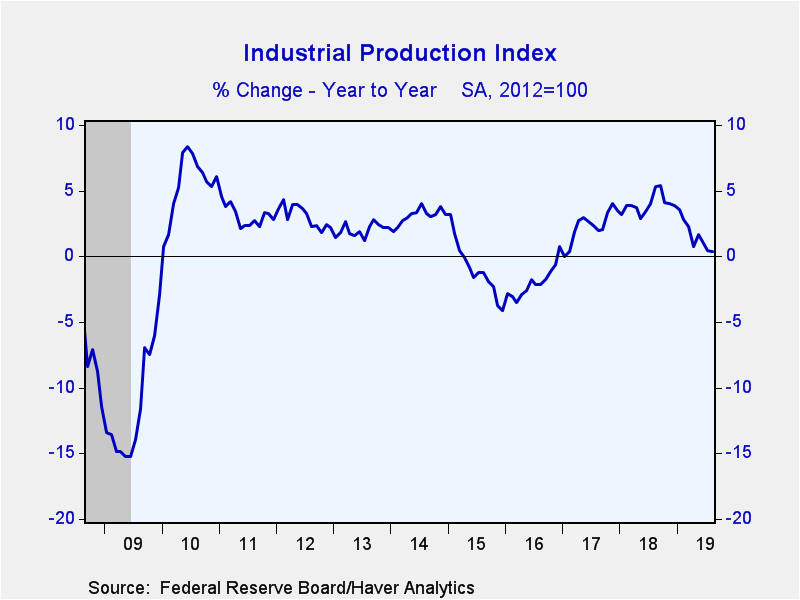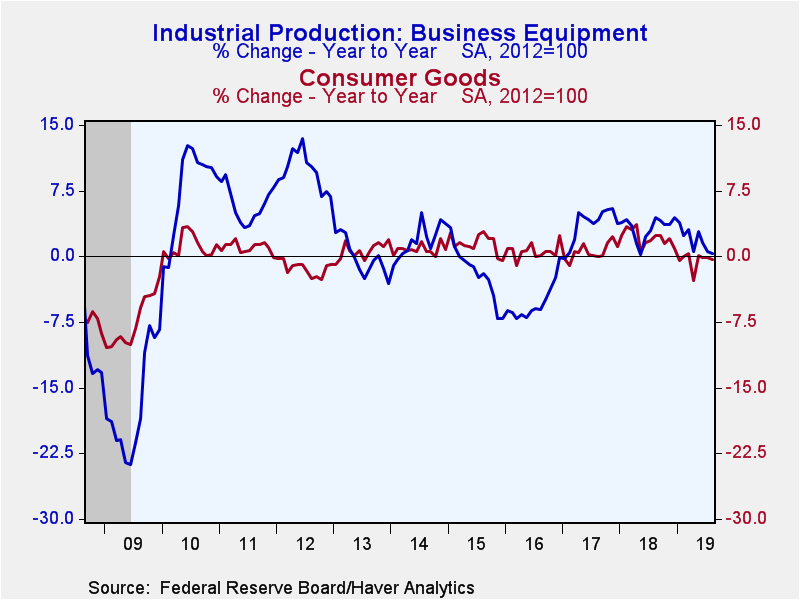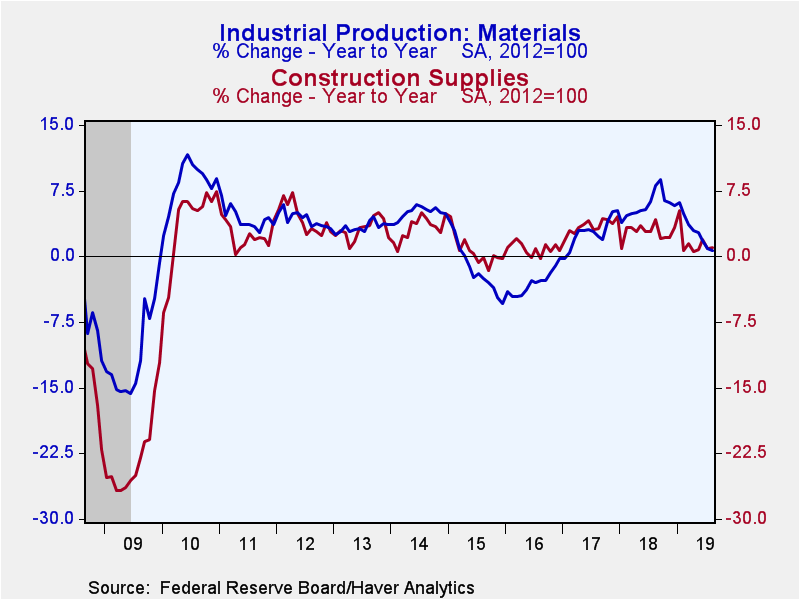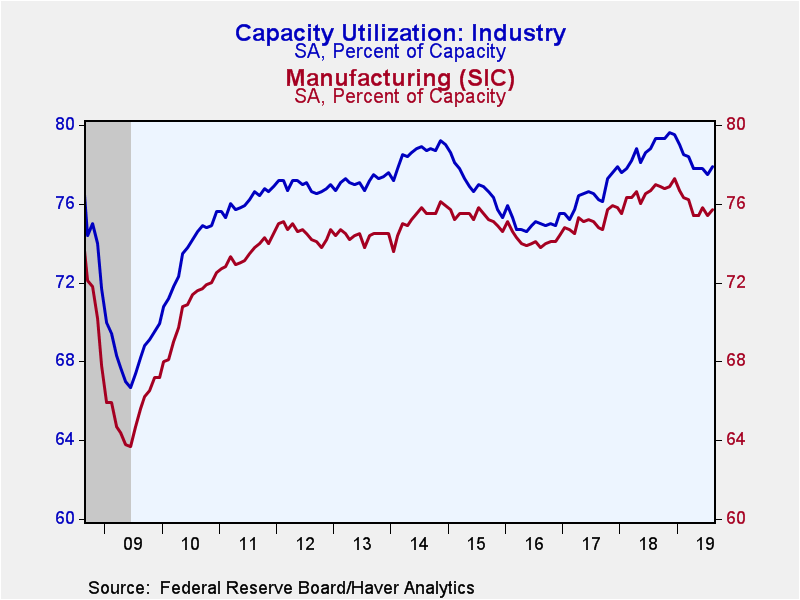 Global| Sep 17 2019
Global| Sep 17 2019U.S. Industrial Production Strengthens
by:Tom Moeller
|in:Economy in Brief
Summary
Industrial production rebounded 0.6% (0.4% y/y) during August following a 0.1% easing in July, revised from -0.2%. A 0.2% gain had been expected in the Action Economics Forecast Survey. Factory sector output improved 0.5% (-0.5% y/y) [...]
Industrial production rebounded 0.6% (0.4% y/y) during August following a 0.1% easing in July, revised from -0.2%. A 0.2% gain had been expected in the Action Economics Forecast Survey. Factory sector output improved 0.5% (-0.5% y/y) and reversed July's 0.4% decline. Production in the mining sector also reversed July's decline with a 1.4% increase (5.1% y/y). Utilities output rose 0.6% (-0.8% y/y) following a 3.7% jump.
Output of final products increased 0.4% (0.1% y/y) following a 0.1% easing. Consumer goods production gained 0.2% (-0.4% y/y). Nondurable goods output rose 0.3% (-0.5% y/y) despite the fact that apparel production dropped 1.2% (-10.6% y/y). Textile mill production improved 0.1% (-3.8% y/y). Petroleum & coal product production posted a 0.3% drop (-2.2% y/y). Chemical output increased 1.1% (-1.2% y/y) but food, beverage & tobacco product production slipped 0.1% (-0.4% y/y). Durable goods production increased 0.5% (0.6% y/y), bolstered by a 1.6% strengthening (2.0% y/y) in machinery output. Computer & electronic product production gained 0.4% (4.4% y/y) but motor vehicle production fell 0.5% (+0.5% y/y). Business equipment production rose 1.0% (0.3% y/y) as industrial & other production surged 1.7% (-0.4% y/y). Information processing & other equipment output improved 0.2% (5.0% y/y).
Materials production increased 0.9% (0.7% y/y) as durable goods output rose 0.6% (-0.1% y/y) and nondurable materials production gained 0.4% (2.7% y/y). Energy materials production strengthened 1.3% (3.5% y/y).
In the special aggregate groupings, production of computers, communications equipment & semiconductors rose 0.8% (1.9% y/y). The latter strengthened 1.4% (1.2% y/y) while computers & peripheral output fell 0.4% (-3.3% y/y). Factory output excluding high-tech and motor vehicles rose 0.6% (-0.6% y/y).
The capacity utilization rate rose to 77.9% and recovered July's decline. It remained below the November 2018 high of 79.6%. The factory sector utilization rate increased to 75.7% but remained below the December 2018 high of 77.3%. Factory sector capacity increased 1.2% y/y.
Industrial production and capacity data and US Population-Weighted Heating and Cooling Days are included in Haver's USECON database. Additional detail on production and capacity can be found in the IP database. The expectations figures come from the AS1REPNA database.
| Industrial Production (SA, % Change) | Aug | Jul | Jun | Aug Y/Y | 2018 | 2017 | 2016 |
|---|---|---|---|---|---|---|---|
| Total Output | 0.6 | -0.1 | 0.1 | 0.4 | 3.9 | 2.3 | -2.0 |
| Manufacturing | 0.5 | -0.4 | 0.6 | -0.5 | 2.3 | 2.0 | -0.8 |
| Consumer Goods | 0.2 | 0.1 | 0.6 | -0.4 | 2.1 | 0.5 | 0.6 |
| Business Equipment | 1.0 | -0.6 | 0.6 | 0.3 | 3.2 | 3.6 | -5.3 |
| Construction Supplies | 0.9 | -1.2 | 0.7 | 1.0 | 2.8 | 3.5 | 0.9 |
| Materials | 0.9 | -0.1 | -0.2 | 0.7 | 5.9 | 2.7 | -3.0 |
| Utilities | 0.6 | 3.7 | -4.1 | -0.8 | 4.4 | -0.8 | -0.4 |
| Mining | 1.4 | -1.6 | 0.5 | 5.1 | 12.4 | 7.4 | -9.9 |
| Capacity Utilization (%) | 77.9 | 77.5 | 77.8 | 79.3 | 78.7 | 76.5 | 75.0 |
| Manufacturing | 75.7 | 75.4 | 75.8 | 77.0 | 76.6 | 75.1 | 74.2 |
Tom Moeller
AuthorMore in Author Profile »Prior to joining Haver Analytics in 2000, Mr. Moeller worked as the Economist at Chancellor Capital Management from 1985 to 1999. There, he developed comprehensive economic forecasts and interpreted economic data for equity and fixed income portfolio managers. Also at Chancellor, Mr. Moeller worked as an equity analyst and was responsible for researching and rating companies in the economically sensitive automobile and housing industries for investment in Chancellor’s equity portfolio. Prior to joining Chancellor, Mr. Moeller was an Economist at Citibank from 1979 to 1984. He also analyzed pricing behavior in the metals industry for the Council on Wage and Price Stability in Washington, D.C. In 1999, Mr. Moeller received the award for most accurate forecast from the Forecasters' Club of New York. From 1990 to 1992 he was President of the New York Association for Business Economists. Mr. Moeller earned an M.B.A. in Finance from Fordham University, where he graduated in 1987. He holds a Bachelor of Arts in Economics from George Washington University.
More Economy in Brief
 Global| Feb 05 2026
Global| Feb 05 2026Charts of the Week: Balanced Policy, Resilient Data and AI Narratives
by:Andrew Cates










